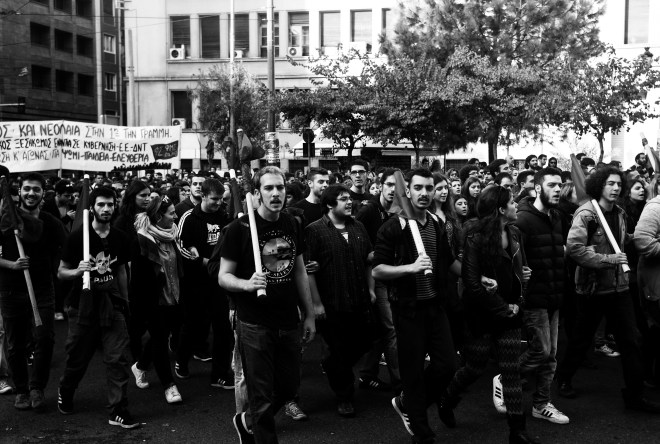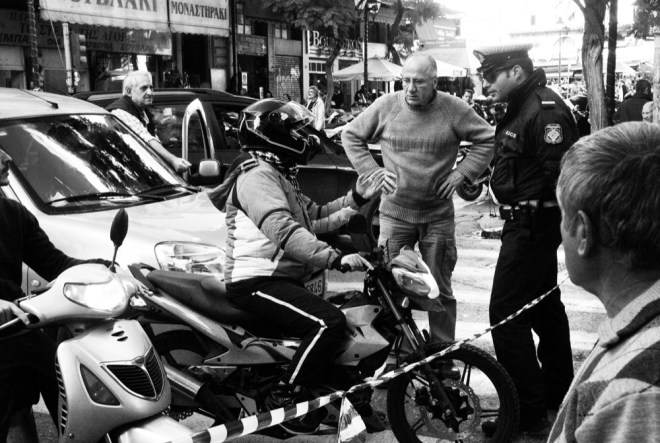There was a powerful image on the news last night. A woman that looked to be at least 80 years old was seen in the middle of rioting in Athens, pulling a Greek flag away from a young man who was trying to set it on fire – his face covered with a gas mask.
The symbolism is poignant, as it so often is in Greece.
Only a week ago the Greek people were celebrating a victory, as they voted to reject stringent austerity requirements being imposed by the dark and powerful forces in Europe. For so long they have had their domestic policies dictated from Berlin via Brussels, and I can only imagine what it must have felt like to be in Syntagma Square when the results came, to feel like some sort of sovereignty was restored to the people at last.
Last night, the Greek Parliament were forced by those same European forces to implement emergency legislation to adopt even stricter measures than the people rejected in the referendum. Syriza did all that they could by calling the bluff of their creditors with the vote. In the end, they played the best hand they could and lost. There was nowhere else to go: accept the terms or leave the Eurozone.
The last few months of 2014 saw trouble on an almost daily basis in Athens. Annual protests that had seen dwindling turn-outs for years suddenly swelled with those taking to the streets to demand an end to the weak leadership of their Government in the face of increasing demands from the Troika.
The one last bit of hope that those involved seemed to be clinging to was the December election, and the potential for the anti-austerity party Syriza, who marched alongside them, to change the way the game was being played. No more taking things lying down. Seemingly against all odds, they got into power. For the first time in years, the riot police were called off, and the protests turned to demonstrations of support for the new government.
There was hope, but it didn’t last for long.
The scenes of last year will be nothing compared to what happens now that even Tsipras, with all of his abilities has been forced to concede defeat. The truth is that no matter how hard or how well he fought, he just didn’t have anywhere near enough bargaining power to win. Without an incredibly damaging exit from the Eurozone, Greece will be forced to do whatever those holding the purse strings demand.
I fear for what will happen now.
There are plenty who say that the Greeks got themselves into this mess, through early retirement ages and high rates of tax evasion. They shouldn’t just be able to shirk their responsibilities, or ‘have their cake and eat it’.
Corruption has been rife in Greece for decades. Nepotism is the norm. However, in many senses it isn’t hard to see why. The British and Americans helped open the doors for a military dictatorship in the country to avoid Communist influence, and Greece shoulders a hugely disproportionate burden in the number of refugees that it receives as the first port of call into the EU. Historically, ideologically, and geographically, they are caught in the middle, with no support from what are meant to be their allies.
Whatever the history is, the present reality is that the rate of child poverty is above 40%. The rate of youth unemployment 50%. Those who do have jobs have been forced to take huge pay cuts, or even to work for free from months to years simply because there’s no other option. The infamous pensions that have been so criticised have been reduced to almost nothing, with it impossible for those who have previously retired to find new jobs. Greeks work longer hours, and own more of their own businesses than a large number of other countries around the world. The generalisations about them being lazy or greedy simply do not play out.
The idea that somehow the Greek people are themselves solely to blame for this crisis, and that they deserve what has happened is an appalling and reprehensible one. People should not be forced to suffer terribly and indefinitely because of the corrupt actions of their previous Governments – those of whom still live comfortably with the proceeds of past malfeasance.
Even if the fault of what has happened really does lie with the average Greek (which it does not) then there must be a way open for the country to get out of the situation they are in. People must be able to build themselves out of poverty, and sometimes that requires acts of compassion and humanity – not cold blooded market capitalism. This is not happening however, and despite even the IMF declaring that repayment of the debt is impossible without some form of relief, the demands just become greater, all the while earning billions in profit for the ECB.
History repeats itself, albeit in different ways. When African nations struggled to pay back impossible debts built up by corrupt dictators, we marched in the street to ‘make poverty history’. When Germany was faced with rebuilding a broken nation after defeat in the Second World War, creditors (including Greece) wrote off a significant portion of their debt so they could do so. Now, the Greeks are facing an impossible task, and nobody seems to care.
Είμαστε όλοι Έλληνες.



















